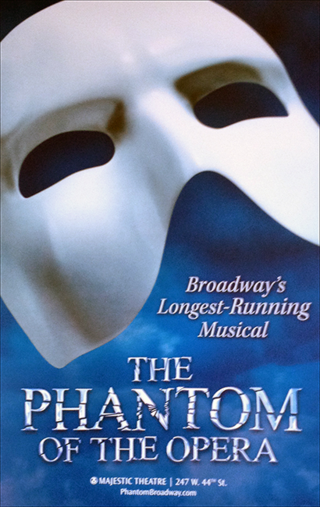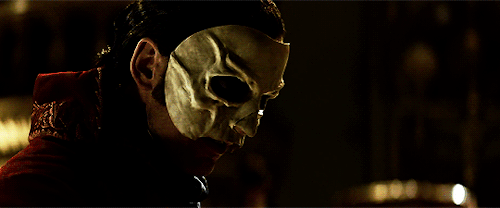What do you think?
Rate this book


360 pages, Mass Market Paperback
First published January 1, 1910
Persons who are visited by the Angel quiver with a thrill unknown to the rest of mankind. And they cannot touch an instrument or open their mouths to sing, without producing sounds that put all other human sounds to shame.

♪ Christine: In the night there was music in my mind
And through music my soul began to soar
And I heard like I've never heard before
Raoul: What you heard was a dream and nothing more.
Christine: Yet in his eyes, all the sadness in the world ♪

"And yet I am not really wicked. Love me and you shall see! All I wanted was to be loved for myself. If you loved me, I should be as gentle as a lamb; and you could do anything with me that you pleased."
Masquerade...
Paper faces on parade
Masquerade...
Hide your face so the world will never find you.






"He said to you, 'Christine, you must love me!'"
At these words, a deathly pallor spread over Christine's face, dark rings formed round her eyes, she staggered and seemed on the point of swooning. Raoul darted forward, with arms outstretched, but Christine had overcome her passing faintness and said, in a low voice: "Go on! Go on! Tell me all you heard! "
At an utter loss to understand, Raoul answered: "I heard him reply, when you said you had given him your soul, 'Your soul is a beautiful thing, child, and I thank you. No emperor ever received so fair a gift. The angels wept tonight.'"

"The house broke into a wild tumult. The two managers collapsed in their chairs and dared not even turn round; they had not the strength; the ghost was chuckling behind their backs! And, at last, they distinctly heard his voice in their right ears, the impossible voice, the mouthless voice, saying:
'SHE IS SINGING TO-NIGHT TO BRING THE CHANDELIER DOWN! '
With one accord, they raised their eyes to the ceiling and uttered a terrible cry. The chandelier, the immense mass of the chandelier was slipping down, coming toward them, at the call of that fiendish voice. Released from its hook, it plunged from the ceiling and came smashing into the middle of the stalls, amid a thousand shouts of terror. A wild rush for the doors followed.
The papers of the day state that there were numbers wounded and one killed. "


Christine: "You. You are the Phantom!"
The Phantom: "If I am the Phantom, it is because man's hatred has made me so. If I shall be saved, it will be because your love redeems me."




Be prepared for murder by hanging, frequent cries of terror from malicious "accidents", and suicide for just a smidgeon of what will "materialize". But, it's the mysterious Opera Ghost who lurks in the shadows using tricks and illusions to work his many evils behind a mask of horror and smell of death that will grab your attention throughout these pages.
This great classic (first published in 1909) is a wonderful haunting read with a dual love story and satisfying ending......oh that first kiss.
Note: "The Opera Ghost really existed. He was not, as was long believed, a creature of the imagination of the artists, the superstition of the managers, or a product of the absurd and impressionable brains of the young ladies of the ballet, their mothers, the box-keepers, the cloak-room attendants or the concierge. Yes, he existed in flesh and blood, although he assumed the complete appearance of a real phantom: that is to say, of a spectral shade." ...........From the author's Prologue.



